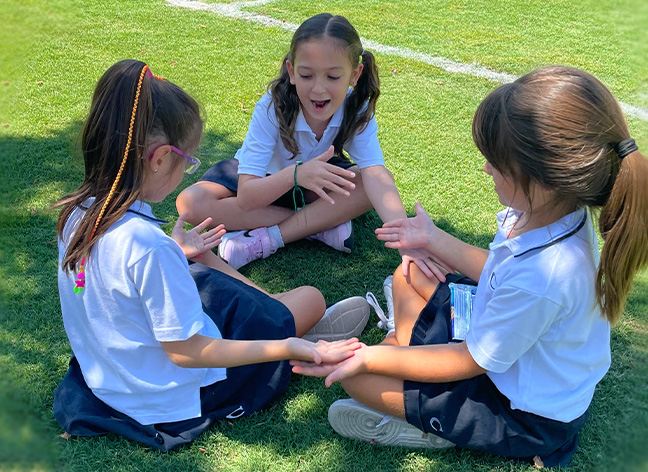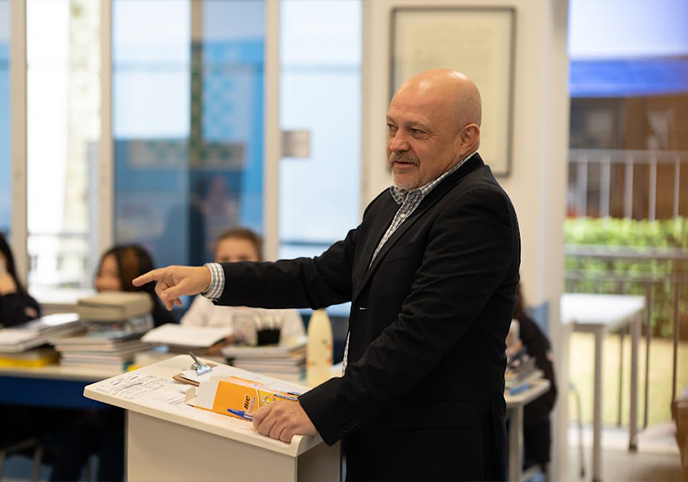In Chapel School’s elementary classrooms, our pedagogical approach places the student at the center of learning. In every classroom, students work collaboratively, researching, sharing, comparing, and analyzing information as they build foundational academic and social skills. Students are encouraged to form their own conclusions and teachers facilitate students’ abilities to make personal connections to their learning.


Elementary students begin the day with a morning prayer and then participate in the Responsive Classroom Morning Meeting in which students must greet each other and have space to share their own personal experiences with their classroom community. Through the Responsive Classroom approach, students engage in both social and academic learning throughout the school day.
The Morning Meeting is structured according to the needs of each group. In the early elementary, there is an added emphasis on the systematization of procedures, routines, and appropriate forms of interaction, while in the upper elementary the moment is used to help students develop and expand their communicative and critical thinking skills.
Students’ daily schedule varies to accommodate core content and specialists classes. Throughout the week students will participate in literacy, math, social studies, science, music, arts, physical education and religion classes. The curriculum in elementary school provides our learners with the opportunity to develop academically in both English and Portuguese as well as to develop social -emotional skills. Technology is also considered core curriculum and is systematically integrated in daily instruction.
Classes are designed to develop students’ sense of responsibility for their own learning, promote the sharing of ideas, and the development of critical thinking skills. Students in the elementary school are encouraged to practice self- assessment and set and monitor their individual learning goals. These goals link to the learning objectives and are specific in meeting each child’s needs.
Recess provides students with the opportunity for free, unstructured play in a supervised and safe environment. Elementary students take advantage of the expansive play area, including the field, two sports courts and playground areas. During the end of day closure, teachers and students reflect and plan next their steps for another successful day of learning.
Chapel elementary school has innovated the traditional homework model, by replacing it with best practices in literacy and student-driven interested-based learning. Students practice literacy skills and build their knowledge and vocabulary by reading on a nightly basis. Each month students design and deliver a Curiosity Project, which gives students flexibility to select a topic they are curious learning more about that may not be found in the written curriculum. Students learn to research, analyze, and synthesize information to present this information to their peers.
Chapel also offers varied extracurricular activities that include sports, arts, science, and technology. These activities take place on the campus, and the offerings depend on student interest.


Science education in Elementary follows the Next Generation Science Standards (NGSS) which guides students to understand core scientific concepts, the scientific process of developing and testing ideas, and to have a greater ability to evaluate scientific evidence. The Next Generation Standards are written as performance expectations in Core Content, Crosscutting Concepts and Science and Engineering Practices.
In our Music Program at Chapel, students have the opportunity to develop their musical abilities by exploring different instruments and movement. From this exploration, the students learn to play, improvise and compose music. Students learn to play the recorder and various types of xylophones and percussion instruments. Every year, through events such as the Music Recital, Talent Show and Christmas presentations confirms the effectiveness of the teaching methods adopted by the department.
Visual Arts education is based on art elements such as line, color, shape, texture, value, shape, and space. During classes, students are exposed to different techniques and materials that provide opportunities to create their visual projects in various mediums (painting, sculpture, drawing and collage). In addition, the Chapel art collection is used to further enrich the classes, serving as an object of appreciation and study. Students have the opportunity to participate in guided tours of the biannual Chapel Art Show and art workshops and exhibitions our partnership museum MAM in São Paulo.
Establishing a strong foundation of literacy in our Elementary students is a key goal of the curricula. By the end of the 6th Grade, Chapel’s Elementary School students achieve academic fluency in both English and in Portuguese. To achieve these results, the Elementary School has approached the literacy in a manner that applies best practices to learning to read and write in both languages.
Being a Writer Program aim to transform writing instruction by helping to create collaborative classrooms, in which students develop both academically and socially as they build their knowledge of and appreciation for the craft of writing. The elements of this process are daily writing – from model texts, sharing ideas between the group, and Author’s Chair when students have the opportunity to share their published texts.
Additionally, Elementary students engage in small group instruction in Guided Reading. Students interact with texts in their ZPD (zone of proximal development) with the support of their classroom and/or reading/writing support teacher. The adoption of common practices and strategies in both English and in Portuguese speaks to our Mission and Vision in that we serve an international student body; one that will need strong literacy skills in more than one language.
Everyday Mathematics, adopted in Pre I through 6th grade, is a spiraling curriculum and enables students to build conceptual understanding, computational fluency, and real world problem solving skills. Everyday Mathematics focuses on first developing student’s understanding of concepts through real world examples and concrete objects, pictorial representations, and requires students to explain their thinking.
